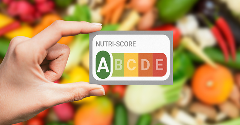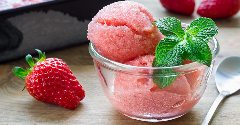News
Consumers seeking healthier snacking options
22 Jul 2016As Americans move away from traditional meal occasions, snacking more throughout the day, consumers are seeking healthier snacking options, according to Mintel, with 73% willing to pay extra for snacks made with high quality ingredients.

As Americans move away from traditional meal occasions, snacking more throughout the day, consumers are seeking healthier snacking options, according to Mintel. New research from the company reveals that three in four (73%) consumers are willing to pay extra for snacks made with high quality ingredients. In further evidence of their desire for healthful foods, half (50%) of consumers say healthier snacks would motivate them to buy more from specialty snack shops.
With snacking now ubiquitous, more than three in five (64%) consumers agree that snacking is necessary to get through the day, including 77% of Millennials, who are the most likely generation to visit specialty snack shops (85% vs 68% of consumers overall). And while 60% of Americans visit snack shops on a mission to treat themselves, Millennials are more likely to be motivated by healthy snack options (68%). What’s more, an extra boost of energy is also a motivator for Millennials as two in five (38%) dine at snack shops for energy compared to one quarter (27%) of consumers overall.Despite high levels of interest, specialty snack shops face stiff competition from retail: two in five (41%) consumers agree that packaged snacks from grocery stores are better than items from snack shops, including 63% of Millennials. Recognizable brands also play a role when choosing snacks, as seven in 10 (69%) consumers say snacks with branded ingredients prove to be higher quality than other snacks. Moreover, seven in 10 (71%) Millennials say snacks are best eaten while on the go, signalling the importance of efficient ordering processes at snack shops.“Snacking is now a staple of the American diet, and as consumers snack more often, they are looking for healthier ways to indulge with high quality ingredients. By including healthier snacks on menus, shops can expand their appeal beyond Millennials, America’s primary snacking generation,” said Diana Kelter, Foodservice Analyst at Mintel. “Snack shops are in a great position to promote themselves both as a destination for the occasional treat and a quick stop for eating on the go. To further compete with the dominant retail snack market, speciality shops should have pre-packaged options available for consumers, as well as partner with recognized brands to offer branded snack fusions.”Customization presents an opportunity for specialty shops to differentiate themselves from retail competition, especially when targeting parents. Indeed, more customizable snacks would motivate 30% of parents to more frequently visit snack shops (vs 18% of non-parents). A similar number of parents (28%) are interested in more snacks with unique flavours (vs 17% of non-parents). Overall, one third (34%) of parents would be inclined to visit snack shops more often if they included more snack options for children.“There is a movement among parents to expand the palates of their children by introducing them to more diverse flavours that don’t typically fit into a kids’ menu. As this trend gains momentum, customizable and build-your-own menu options are rising to the occasion. This gives specialty shops the chance to differentiate themselves by providing unique snacks that appeal to the entire family,” continued Kelter.Deals and value offers are key motivators for consumers to visit specialty snack shops instead of opting for the convenience of retail offerings. Mintel research reveals that snack shops can attract new consumers and reward regulars by offering loyalty programs, which motivate 37% of consumers to visit more often.When unveiling new menu items, promotional pricing motivates 35% of consumers, including two in five parents (39%). And in line with Millennials’ interest in going to shops to enjoy a snack with friends and family (39%), two in five (38%) would visit snack shops more often if they offered social-themed promotions such as happy hours.“Loyalty programs are important for various reasons. First and foremost, it’s a way to retain satisfied new customers while incentivizing returning customers. As digital loyalty programs advance, it’s also a way for shops to gather consumer purchasing behaviours and preferences. Thanks to the inherent social aspect of snack shops, they have a unique opportunity to focus on the happy hour model to encourage group gatherings,” concluded Kelter.Related news

Danone removes NutriScore from products
20 Sep 2024
Following an algorithm update that gives some of its sweetened drinks a worse score, Danone has removed the front-of-pack label, NutriScore, from all of its products – putting profit before public health, say campaigners.
Read more
Diestel is first turkey producer to snag Regenifed certification
17 Sep 2024
In the US, Diestel Family Ranch, a family-owned turkey farming venture, has become the first producer to gain Regenified certification for its whole turkey and processed turkey product ranges.
Read more
Indonesia introduces new halal certification system
9 Sep 2024
International food and beverage companies importing halal products into Indonesia need to adhere to new rules after the country introduced a new halal certification system.
Read more
Tesco trials methane mitigation supplement for dairy cattle
5 Sep 2024
Tesco is trialing a methane-reducing feed supplement for one of its key UK dairy farms, sustainable UK milk producer Grosvenor Farms.
Read more
USDA launches new nutrition hub network
22 Aug 2024
The United States Department of Agriculture (USDA) will invest $4.5 million into providing nutritional advice and guidance across the US.
Read more
Better Juice expands its range to sorbets
16 Aug 2024
Food tech startup Better Juice has developed a technology to reduce the sugar content in fruit sorbets. The process retains the natural vitamins, minerals, and flavours of fruit, while offering manufacturers an easy-to-implement and scalable solution t...
Read more
Sweden updates front-of-pack Keyhole labelling rules
11 Jul 2024
The Swedish Food Agency has announced updates to the voluntary Keyhole logo, used in four Nordic countries, following recommendations to improve nutrition labelling.
Read more
The seed oil backlash: How food and beverage brands are adapting
9 Jul 2024
There is a small but growing anti-seed oil movement, with some consumers perceiving seed oils – such as rapeseed oil and sunflower oil – as harmful for human health, despite the advice of nutritionists and assurances from dietary authorities.
Read more
Tesco launches laser-etched avocados to reduce plastic packaging
3 Jul 2024
UK supermarket chain Tesco is trialing a new laser-etched avocado range as part of its measures to cut down on plastic packaging and enhance its environmental profile.
Read more
Researchers tap into sticky rice as a potential source of clean label starch
8 May 2024
Pigmented waxy rice may prove to be a good source of clean label starch, according to researchers at the University of Arkansas.
Read more